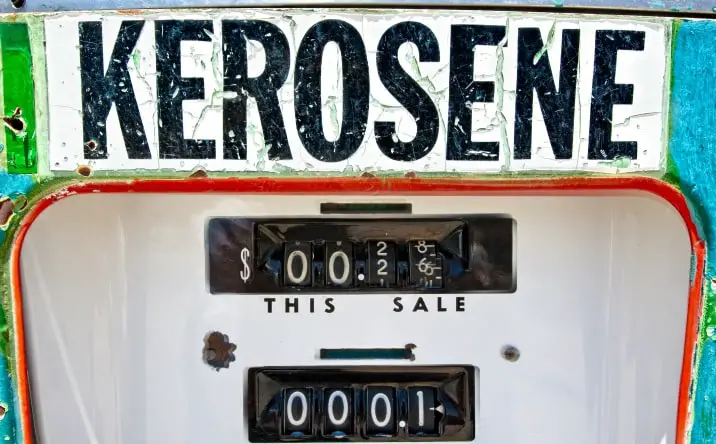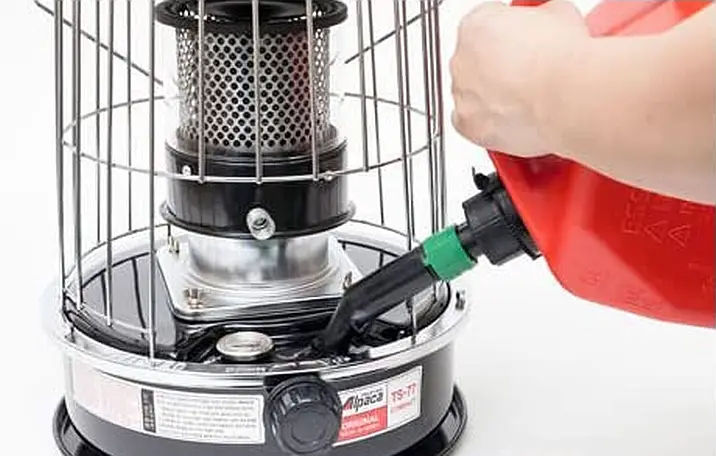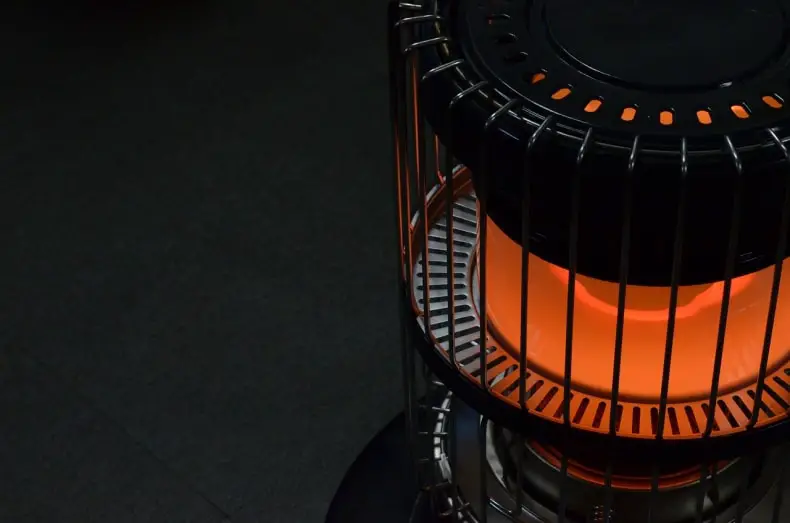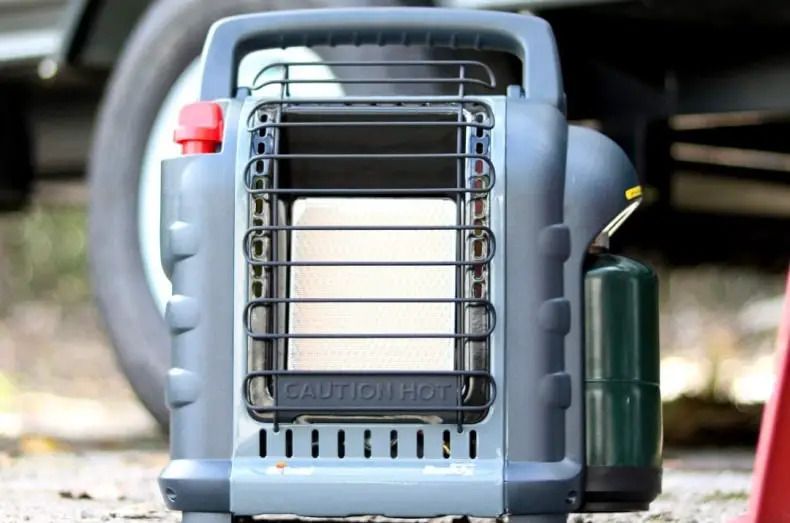Kerosene Heaters can be wonderful and very useful. They are safer than other gas heater types, and kerosene itself is considered safe to use most of the time. Although too much of it can cause carbon monoxide poisoning, you’re at very low risk of this. Yet will other substances work in your kerosene heater, should you run out of kerosene?
One big question people often ask is, can you run diesel fuel in a kerosene heater?
Although not ideal, you can run diesel fuel in a kerosene heater but you’ll want to use a diesel fuel that is sulfur-free. For safety, you’ll also want to make sure the area is well-ventilated as the combustion of diesel emits dangerous gases you shouldn’t breathe.
Okay. Sure, you CAN use it but should you? Are there dangers to using it? Will the heater be any problems with leftover diesel fuel once you refill the heater with kerosene? Those questions and more likely should be answered in-depth.
Since we want to do our best to keep you safe and in the know, we’re going to go over this entire subject matter.
Table of Contents
Running Diesel Fuel In A Kerosene Heater
To the surprise of many, diesel fuel somehow is able to burn incredibly well inside many kerosene heaters. There very little or no actual differences in flame height or heat output.
There is a drawback to this, in that overuse of diesel fuel can affect the wick of your heater. Of course, replacing a wick can be pretty cheap to do. Yet this will still take repeated use of diesel fuel, not just a few uses.
The heater will still do exactly as designed, without causing any major differences. This is important, as some fuels could likely affect flame height and even make the unit explode.
As far as we can tell from those who have done it, it’s completely safe from a fire safety standpoint. In fact, diesel engines are even capable of using other fuels, with proper treatment. Therefore, it tracks that diesel fuel could do the same. The question here really is why you’d want to.
Cost-Effective?

For many, using diesel fuel for their kerosene heater comes down to the price. A bottle of one gallon of Kerosene can cost between $8 and $15, depending on where you get it. While this cost stays the same pretty much the entire time, both regular Unleaded Gasoline and Diesel will fluctuate throughout a given year.
Therefore, it’s hard to know if Diesel will be worth paying for depending on the price it’s going for versus that of a gallon of kerosene. Usually, it is at least a few dollars less than Kerosene per gallon on average, however.
As of this writing, the Energy Information Administration claims that diesel fuel prices will continue to rise as it remains higher than regular gasoline. This was after periods in history when diesel was actually cheaper, causing many to switch to diesel engine vehicles to save money.
The average price right now, according to the U.S. EIA is between $2.10 and $3.00 nationally across the United States. This is at least around $5 dollars in savings per gallon or slightly more, depending on where you get it.
Therefore, it makes sense that people would want to use diesel fuel in their kerosene heaters. It is cheaper to do so. The problem, for many, is how safe this is to do.
Dangers To Using Diesel In Place Of Kerosene
Interestingly, kerosene is known for its impressive flashpoint. This is the lowest level at which a liquid will form a vapor in the air near its surface that will result in a flash. In this case, a flash is a brief ignition when exposed to an open flame such as one it might see from a lighter.
Knowing the flashpoint is important because it gives you the general idea of how flammable or combustible a particular liquid might be. When we say “liquid” here, we’re speaking in terms of those that can actually take a flame, such as petroleum products. Not something like water.
Diesel happens to have a higher flashpoint than Kerosene. This means there is no risk of it flaming up or blowing up your unit. Making it safe to use from a fire safety standpoint. Yet that does not make it safe.
Regular diesel fuel is not designed for heaters, but rather, vehicles. The diesel fuel from your local gas station contains additives and especially sulfur. This will, in turn, begin to create a problem inside your heater. Soot and Creosote will develop and cause your heater to begin excreting poisonous air.
Thereby, killing you via odorless or sometimes massively odorous fumes.
Better Option:
The sulfur is why your heater wick can get clogged up and no longer work after repeated use of diesel fuel. It is not made for that, and diesel fuel is surely not designed for heating homes.
If you do plan to use it, buy diesel fuel that does not contain any sulfur. The kind you get at the gas pump will have it. However, many auto stores or home and garden stores should sell “Sulfur-Free” Diesel Fuel, which is far safer to use in your kerosene heater.
You’ll need to ultimately look for something known as “Ultra-Low-Sulfur Diesel,” as it’s much easier to find than diesel without any sulfur at all. However, this will cost a bit more per gallon than regular diesel fuel at the pump.
Will Using Diesel Hurt Your Kerosene Heater?

We just referred to a problem that regular diesel fuel will offer, that is the problem of what it leads behind that vehicles can contain but heaters cannot. You do not want to have a problem breathing or die as a result of trying to save money.
This is why we’d only recommend using the lower sulfur version. However, you are STILL going to have some form of sulfur as well as diesel additives. Those will be left behind and will hurt the integrity of your kerosene unit.
Since Kerosene burns clean, it will begin to evaporate in the air creating vapors. It is the vapor that is being burnt here, not the actual full kerosene anyway. Yet diesel does not evaporate well, meaning you’re burning the actual diesel fuel and not vapors.
That is another reason why your wick gets so screwed up by the use of diesel, it’s literally burning the wick when it is not supposed to burn. The exhaust from diesel will continue to be burnt and get into the air when the heater is on. Yet it will also leave behind a lot of bad particles that won’t just go away easily.
Therefore, yes, it will hurt your kerosene heater even after just one use. However, it could be massively problematic if used repeatedly.
Essentially, this comes down to a carbon dioxide and carbon monoxide situation.
The Important Difference In Kerosene vs Diesel Risks
We mentioned how this comes down to a carbon dioxide versus carbon monoxide issue. The reason we reference this is that overexposure to one or the other can be a risk for kerosene and diesel.
For kerosene, you’re more at risk to be affected by carbon monoxide. Yet with diesel, it’s carbon dioxide. The real issue here is that kerosene heaters rarely ever put you at risk of carbon monoxide poisoning.
However, it’s always advised to have a carbon monoxide detector in your home when you’re using kerosene. Just so you’ll be prepared for IF kerosene is putting this out into your home at some point.
Diesel fuel will, regardless of the type you use, expose you to a lot more carbon dioxide than you should be exposed to. Seeing as there is nowhere for it to escape in the home, it’ll begin to affect the oxygen in your home. Carbon dioxide literally kills by replacing oxygen in the air too!
Carbon Monoxide kills by affecting the oxygen in your blood. Both are risky but one is significantly easier to notice than the other. This is why Diesel can be so dangerous and Kerosene is seen as far less of a problem.
Kerosene vs Diesel:
When you burn diesel, it is made to use for vehicles. This is why the carbon dioxide it gives out is not much of a problem. It is in an open engine where the fumes will escape into the environment. This is still a problem for the environment, but not for the driver of the vehicle.
Yet if we put diesel inside a home, it’s almost like letting the diesel exhaust from a vehicle into your home too. While not quite as bad as that, it’s not as far off as you might think.
The clean nature of kerosene and how it burns makes it a much better choice for the home. We yet again point to the fact that these heaters are burning kerosene vapors, allowing the kerosene to go away very fast.
With diesel, you’re not getting that. This is why, even though it is clear that you “can” use diesel fuel in a kerosene heater, it is completely stupid to do. It hurts the integrity of your heater for the long-term, your heater wick, and it’s not even safe for you to breathe in over the long-term.
Is saving a few bucks per gallon really worth the cost of your own life? We’re gonna go with a no on that one.







